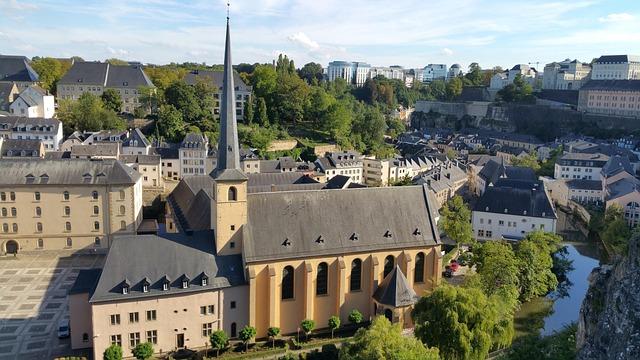Introduction: Luxembourg’s Leadership in the Gender, environment, and Climate Nexus
As the world grapples with intertwined crises of climate change and gender inequality, Luxembourg emerges as a pioneering force in addressing these challenges through an integrated approach. The OECD’s latest report highlights the Grand Duchy’s commitment to promoting gender equality while tackling environmental issues, positioning it as a key player on the global stage. With initiatives that align economic growth with sustainable development, Luxembourg is redefining the narrative around the climate crisis by emphasizing the critical importance of women’s empowerment and inclusion in environmental decision-making processes. This article delves into Luxembourg’s innovative strategies and policies that not onyl pave the way for greener practices but also champion the rights and roles of women, illustrating how a balanced focus on gender and environment can lead to comprehensive solutions for a sustainable future.
luxembourgs Pioneering Role in Gender Equality and Environmental Stewardship
Luxembourg stands at the forefront of promoting gender equality and environmental stewardship, effectively intertwining these crucial issues to pave the way for sustainable development. The nation has implemented comprehensive policies that not only aim to achieve gender parity but also address environmental challenges. For example, government initiatives encourage women’s participation in green jobs and leadership roles within the environmental sector, fostering innovative solutions that address climate change while promoting social equity. By prioritizing inclusive decision-making, Luxembourg inspires other nations to recognize and harness the potential of diverse perspectives in tackling global issues.
The intersection of gender and environmental policy is evident in Luxembourg’s strategic investments and programs. Key strategies include:
- Green financing: Allocating funds specifically aimed at supporting women-led enterprises in the sustainable sector.
- Education and training: Offering scholarships and training programs for women in fields related to environmental science and renewable energy.
- Community engagement: Promoting grassroots initiatives led by women to tackle local environmental challenges.
These forward-thinking actions have positioned Luxembourg not only as a leader within Europe but also as a model for how integrating gender considerations into environmental policies can create more resilient and equitable societies.

Understanding the Climate Nexus: How Gender Equity Shapes Sustainable Policies
In recent years, the interconnections between gender equity and environmental sustainability have gained significant traction within policy frameworks, particularly in progressive nations like Luxembourg. Initiatives led by the government showcase an understanding that sustainable policies are more effective when they embrace a gender-responsive approach.By acknowledging the diverse roles and perspectives of women in environmental management, Luxembourg is setting a precedent that highlights the necessity of integrating gender considerations into climate policies. This holistic perspective not only fosters inclusive decision-making but also enhances the resilience of communities against climate change impacts.
The positive outcomes of this approach can be observed through various initiatives and programs that empower women as leaders in environmental conservation and climate action. Examples of effective strategies include:
- Capacity building: Programs designed to equip women with skills in sustainability practices.
- Engagement: Encouraging women’s participation in climate policy discussions.
- Investment: Funding projects led by women that focus on renewable energy and sustainable development.
These strategies not only amplify women’s voices but also demonstrate that equitable participation leads to innovative solutions for climate challenges. As Luxembourg continues to advocate for its role in the gender, environment, and climate nexus, it serves as a vital model for other nations striving for both sustainability and equality.

Evaluating Luxembourg’s best Practices in Integrating Gender and Environmental Strategies
Luxembourg has emerged as a pioneering force in harmonizing gender equality with environmental strategies, showcasing an integrative model that many countries are keen to emulate. By prioritizing interdisciplinary policies, the Grand Duchy has ensured that environmental initiatives are not only ecologically sound but also socially equitable. This approach is reflected in key areas such as:
- Inclusive decision-making processes that actively involve diverse gender perspectives.
- Targeted funding for women-led environmental projects, fostering leadership in sustainability.
- Educational programs aimed at empowering women and promoting green skills within their communities.
In addition to these strategies, Luxembourg’s commitment is visible in their robust data collection and analysis, focusing on gender-disaggregated data to inform policy decisions. This has resulted in significant advances uniting gender parity with climate resilience, effectively addressing the unique challenges faced by women in environmental contexts.The following table summarizes some of the notable policies implemented:
| Policy Initiative | Goals | Impact |
|---|---|---|
| Women’s Climate Fund | Support women-led green initiatives | Increased funding for 30+ projects |
| Gender-responsive Environmental Policies | Integrate gender in environmental laws | Enhanced women’s participation in policy-making |
| Green Job Training Programs | Empower women in renewable sectors | Created 150+ jobs for women |

Recommendations for Enhancing Gender-Responsive Climate Action in Luxembourg
To advance gender-responsive climate action in Luxembourg, it is essential to implement comprehensive strategies that prioritize inclusivity and equity in environmental policies. One significant avenue is to enhance capacity building for women in climate-related sectors.This may include:
- Providing specialized training programs for women in sustainable agriculture and renewable energy technologies.
- Establishing mentorship initiatives that connect women leaders with emerging professionals in environmental fields.
- Enhancing access to funding for female entrepreneurs focused on green businesses and sustainable practices.
Additionally, fostering collaboration between governmental bodies and local feminist organizations can lead to more effective and inclusive climate initiatives. A balanced approach could involve:
- Incorporating gender analysis in the formulation of climate action policies to identify and address gender-specific vulnerabilities.
- Establishing a dedicated task force that focuses on promoting women’s engagement in climate decision-making processes.
- Creating public awareness campaigns that highlight the critical role women play in environmental stewardship and community resilience.

The Impact of Inclusive Leadership on Effective Climate Solutions
Inclusive leadership plays a crucial role in addressing climate challenges by fostering diverse perspectives and innovative solutions. By bringing together voices from various backgrounds, organizations can identify unique approaches to sustainability that might be overlooked in a homogeneous environment. This inclusive approach not only enhances decision-making but also cultivates an atmosphere of trust and collaboration among team members, which is essential for driving impactful climate initiatives. Leaders who embrace diversity are better equipped to tackle complex environmental issues, as they draw on a broader range of ideas and experiences.
Moreover, promoting gender equality within the context of climate solutions ensures that the needs and insights of all community members are taken into account. Evidence shows that women’s participation in leadership roles can substantially enhance environmental governance and policy-making. By actively involving women, organizations can achieve more comprehensive and effective climate strategies. Key benefits include:
- Diverse Solutions: Women often prioritize sustainable practices owing to their unique experiences.
- Stronger Community Engagement: Inclusive leadership fosters stronger connections with local communities.
- Enhanced Resilience: diverse teams are better equipped to adapt to changing environmental circumstances.
| Gender Representation | Impact on Climate Solutions |
|---|---|
| Low Representation | Lack of diverse perspectives results in missed opportunities. |
| Moderate Representation | Some innovative ideas, but limited community engagement. |
| high Representation | Comprehensive strategies leading to effective solutions. |

Towards a Sustainable Future: Bridging gender and Environmental Initiatives in Luxembourg
In an era where the implications of climate change are felt across the globe, Luxembourg is emerging as a frontrunner in the intersection of gender equality and environmental sustainability. The contry recognizes that empowering women is not just a matter of social justice but also a critical component of effective climate action. Women’s leadership in environmental initiatives—ranging from community projects to policy-making—is fostered through targeted programs that aim to enhance their capacities. These initiatives can include:
- Training and education: Providing workshops focused on sustainable practices and climate resilience.
- Policy advocacy: Supporting women to participate in environmental policy discussions at local and national levels.
- Networking Platforms: Creating opportunities for women to connect and collaborate on sustainability projects.
Furthermore,Luxembourg’s government collaborates with local NGOs and international organizations to implement integrated solutions that consider gender as a core dimension in environmental policies. By adopting a holistic approach that intertwines gender-based perspectives with climate strategies, the nation is actively working to enhance resilience and adaptive capacities among marginalized communities. The following table illustrates key initiatives and their impacts:
| Initiative | Impact |
|---|---|
| Women in Green Tech | Increased representation of women in technological innovations aimed at sustainability. |
| Eco-Femmes Network | Empowerment of women through knowledge-sharing and resource mobilization. |
| Climate Action Fund | Financial support for female-led environmental startups and projects. |
In Summary
Luxembourg’s proactive stance at the intersection of gender, environment, and climate issues stands as a commendable model in the global landscape. As highlighted in the latest OECD report, the Grand Duchy has made significant strides in integrating gender perspectives into environmental and climate policies, fostering sustainable development while promoting social equity.By prioritizing investment in women’s leadership and participation,Luxembourg not only addresses pressing climate challenges but also empowers a broader swath of its population. This multifaceted approach not only enhances national resilience but also contributes to the global discourse on sustainable development.As other nations look to replicate such success, Luxembourg’s commitment to an inclusive and environmentally sustainable future serves as a beacon for comprehensive policy-making in the face of ongoing climate crises. The path forward calls for continued collaboration,innovation,and commitment to ensuring that both gender equality and environmental sustainability are at the forefront of national and international agendas.
















